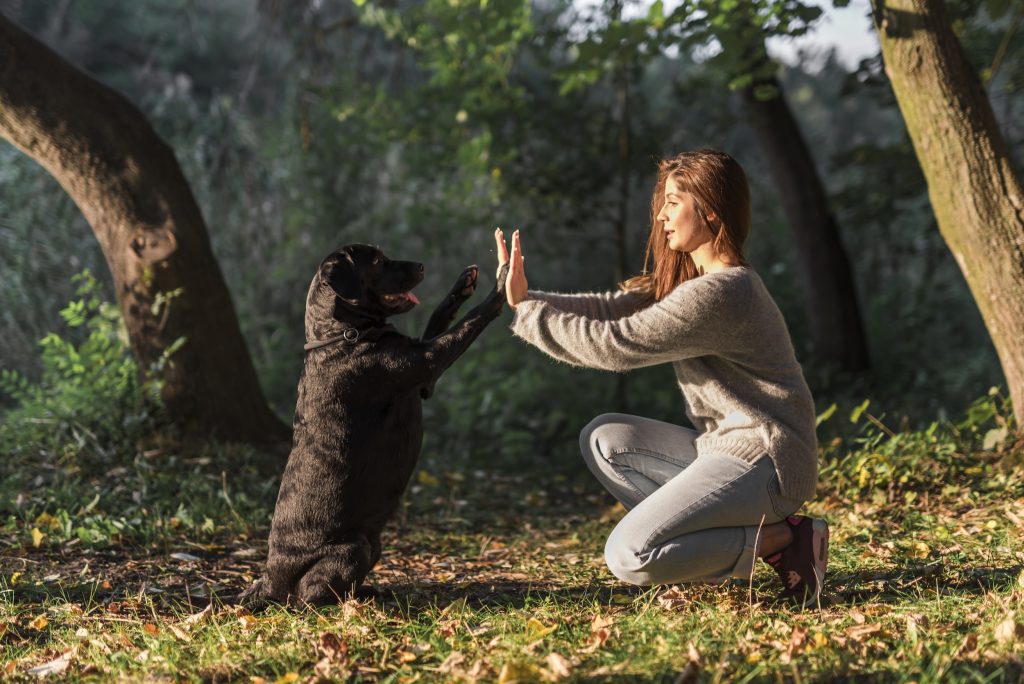Barks Blog
Embracing Variety in Your Dog Training Business

In this article, the experts at dogbiz share tips for dog trainers who may be struggling with whether to niche down or be a generalist.
Ask dogbiz
Q: Hi dogbiz,
I’ve been hearing a lot about the importance of having a niche in dog training. Everyone says it’s the key to success, but the truth is, I love variety. I enjoy working on a wide range of things: puppy basics, basic manners, behavior modification, scent work, agility—you name it. I also enjoy working with all kinds of dogs and people, not just one specific type. Is it still possible to run a successful business without niching down?
Thanks,
Casey
A: Hi Casey,
First of all, let’s give you a big high-five for embracing your wide range of interests! You’re not alone—many trainers feel torn between narrowing their focus for marketing purposes and wanting to offer a broader array of services that keep them engaged and excited. So, let’s break it down: is it possible to run a successful dog training business as a generalist? Absolutely!
In fact, being a generalist can be a great choice—if you approach it strategically. Let’s talk about why this works, the challenges you might face, and how you can build a thriving business without focusing on a niche.

The Pros of Being a Generalist
1. Variety Keeps Things Fun
If you’re someone who loves to shake things up and work on a wide range of skills, being a generalist means every day is a new adventure. One day, you’re guiding a shy dog through socialization exercises; the next, you’re teaching a spirited puppy how to walk nicely on a leash; and then you’re doing scent work with a team of enthusiastic search dogs. As a generalist, you get the satisfaction of seeing progress across all areas of dog training, which can be fulfilling and exciting. Each day is different, and that variety can make your work feel like it’s never the same old grind.
2. A Broader Client Case Means More Opportunities
As a generalist, you’re not limited to one specific type of dog or behavior. Instead of focusing solely on reactive dogs or just teaching puppy basics, you can appeal to a broader audience. Whether clients need help with a new puppy, a behavior problem, or even more advanced dog sports, you’ve got the skills to address it all. This range of services allows you to cast a wider net and attract more clients who may need different types of help.
What’s even better is that your clients will stick with you as their dogs grow. Maybe a family comes to you with a rambunctious puppy and signs up for basic manners. Down the line, as that dog matures, they might want to get into agility or work on some complex behavior challenges. If you’re offering a wide range of services, there’s a good chance they’ll keep coming back to you for every stage of their dog’s development.
3. Flexibility to Evolve With Trends
The dog training world is always evolving, and new trends, tools, and techniques pop up all the time. As a generalist, you can take advantage of these changes without feeling stuck in a niche. If canine fitness becomes popular, you can add it to your repertoire. If there’s a growing interest in scent work or therapy dog training, you can upskill and offer these services as well.
Being flexible allows you to tap into new areas of interest and keep your business fresh. If you’re a generalist, you’re in a perfect position to experiment with different types of training. Whether you want to expand into dog sports or specialized areas like chase behavior, being a generalist means you can grow and change without worrying about whether it fits into a niche.
4. Seeing the Full Picture
As a generalist, you’re often in a position to take a more holistic approach to dog training. For example, a dog’s behavior issue might stem from a lack of physical exercise, poor socialization, or a lack of mental stimulation. Rather than just working on one issue, you can address the bigger picture by offering a combination of training techniques, fitness programs, and enrichment activities to support the dog’s overall well-being.
Clients often come to you for one thing, but by recognizing the broader context of their dog’s life, you can offer a more comprehensive, personalized solution. Whether it’s combining behavior modification with scent work to mentally stimulate an anxious dog or offering agility classes to provide both physical exercise and a fun outlet for high-energy dogs, your ability to create holistic programs will make a huge difference in your clients’ results.
The Cons of Being a Generalist
1. Standing Out Can Be Harder
Let’s face it: there are a lot of dog trainers out there, and when you’re a generalist, standing out in a crowded market can be challenging. When a potential client is looking for help with something specific—say, leash reactivity or separation anxiety—they might be more inclined to pick a trainer who specializes in that one area.
But don’t worry, this doesn’t mean you’re doomed to blending into the background. The key to standing out as a generalist is to focus on your approach, philosophy, and unique skills rather than a narrow niche. For example, you can position yourself as a trainer who uses positive reinforcement across a variety of issues, or someone who’s particularly good at making training fun and engaging.
Make it clear that you are a trainer who can solve a range of problems using techniques that work for every dog, from the easiest to the most challenging. It’s all about how you communicate your unique offering.
2. Marketing Might Feel All Over the Place
The other downside to being a generalist is marketing can get a little messy. While niche trainers can have a laser-focused marketing strategy—say, they only talk about reactive dogs and market themselves as experts in that area—generalists have to appeal to a wider audience. You’re juggling multiple services, and that means your marketing needs to be broad enough to cover all the bases.
Instead of trying to market every service under the sun in one big message, break your marketing up into manageable, targeted campaigns. You might run a special campaign on social media about helping puppies get off to the right start, then follow it with a series about how to improve loose-leash walking, and then another one about dog sports for advanced pups. By focusing on one topic at a time, you can keep your messaging clear without confusing potential clients.
Another key tip is to highlight client success stories across different areas of training. Showcase the variety of dogs you work with and the different challenges you help them overcome. Seeing a dog who started with behavior issues go on to thrive in an agility class will show clients that you have the skills and experience to help with a broad spectrum of needs.
3. Burnout Is a Real Risk
When you’re doing everything—puppy training, behavior modification, agility, scent work, etc.—it can become exhausting. Each type of training has its own set of challenges, and it’s easy to burn out if you’re constantly switching gears. It’s a bit like being a jack-of-all-trades: you’re spreading yourself thin, and at times, it can feel like too much.
To avoid burnout, batch similar tasks together. If you’re teaching agility one day, schedule other activities that require similar energy the same day. This way, you aren’t jumping between very different types of training, which can be mentally and physically taxing. Also, prioritize rest and self-care to make sure you’re replenishing your energy, so you can give your best to every client.
How to Make It Work as a Generalist
Even with these challenges, being a generalist can be a great way to run a dog training business. So, how do you make it work?
1. Leverage What Makes You, You
While niche trainers often focus on specific methods or challenges, you can carve out your own space by emphasizing your approach to training. Maybe you’re known for creating engaging, fun training sessions that make clients feel like they’re playing rather than working. Or maybe your thing is being particularly skilled at reading and addressing subtle body language cues in dogs. Highlighting your training style will make you more memorable, even if you aren’t specializing in just one area.
2. Future-Proof Your Business
Being a generalist gives you the advantage of future-proofing your business. Trends in dog training can change rapidly, particularly in response to cultural shifts and technology. As a generalist, you have the freedom to adapt and integrate these changes without feeling stuck. You can evolve with the industry and offer cutting-edge services that attract a wide range of clients.
Clients will appreciate that you stay current with trends and can offer new services, tools, and solutions that cater to their changing needs. By remaining flexible and open to growth, you position your business as forward-thinking and adaptable.
3. Focus on Building Relationships
As a generalist, you have the opportunity to build long-term relationships with clients. You can follow a dog through their entire training journey, from puppyhood to adulthood, and beyond. This creates a bond of trust, which leads to repeat clients and word-of-mouth referrals.
Show your clients that you care about their dog’s progress, not just about selling them your services. Offer follow-up support, give them tips on how to reinforce lessons at home, and always check in to see how their dog is doing. These personal touches can turn a one-time client into a lifelong supporter.
4. Stay Flexible With Services
Flexibility is key to thriving as a generalist. Offer packages that allow clients to mix and match different services based on their dog’s needs. For example, you could create a “puppy foundation and rocket recall” package or a “reactivity and scent work” bundle. This allows clients to easily understand the value of your varied services while still keeping things organized.
You can also explore group classes or online options that let you expand your reach without overwhelming yourself. For instance, offering a virtual puppy class or a group behavior session helps you serve more clients without burning out.
5. Keep Marketing Simple but Strategic
You don’t have to market every single service at once. Create separate campaigns for different areas of training and let each one speak to the right audience. Highlight your variety without overloading potential clients. Remember, you’re offering something for everyone, but that doesn’t mean you need to showcase it all in one post or email.
Instead, lean on your brand—your training philosophy, your personality, and the problems you can solve. People are drawn to trainers who feel genuine, and by focusing on what makes you unique (whether it’s your calm demeanor, your patience, or your impressive list of certifications), you’ll naturally attract clients who appreciate your broad skill set.
Being a generalist in the dog training world isn’t just possible—it can be incredibly rewarding. The variety of clients and challenges you’ll face makes every day interesting and gives you the flexibility to adapt and grow your business. While marketing may be a bit more challenging and standing out requires a clear, authentic approach, with the right strategies, you can absolutely make it work.
So, if you love working with all types of dogs and dog guardians, don’t let the “niche down” advice scare you off. Embrace your generalist nature, stay focused on what makes you unique, and you’ll thrive.
Good luck,
The dogbiz Team
Learn how dogbiz can support your success at dogbizsuccess.com.
Have a question for the business experts at dogbiz? Submit your question for consideration to [email protected].

